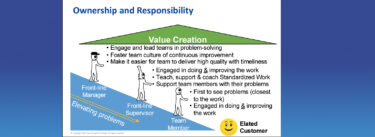My colleague John Shook has recently written a wonderful book for LEI about “managing to learn”. By this he means the method of discovery that lean managers use to deploy initiatives from higher organizational levels, solve problems at their organizational level, and evaluate proposals from lower organizational levels. By using this method at every level on a continuing basis, organizations truly learn how to learn while creating ever better managers.
In Managing to Learn John contrasts the lean manager with the old-fashioned “dictator” manager — who simply tells everyone what to do — and the new-fashioned modern manager — who tells subordinates to get the job done using whatever methods come to hand so long as they meet their objectives. The lean manager, by contrast, asks his subordinates about the process they will use to deploy, to solve, and to evaluate, in the belief that if the process is right the results will be right. Rather than giving answers or simply accepting results, the lean manager says, “Let’s do this together. Let’s go see (at the gemba), ask why, and show respect.”
John’s advice, based on his years as a manager at Toyota in Japan and the U.S., is truly profound and has changed my life as a manager. But there is one small problem as we try to spread lean management across the Lean Community and around the world. Where do the lean managers (the Sandersons in John’s book) come from who can teach the rest of us traditional managers (the Porters) to manage in a new way? In sum, how do we all learn (or relearn) to manage so we can manage to learn? Books are a great start, but how do we learn through practice (the only real way to internalize new methods), particularly when our boss is stuck in outmoded ways of managing?
Modern management’s answer to the problem of creating new managers is to send them to school, specifically management schools with classroom teaching. The alternative is to purchase pre-trained managers, usually from consulting firms where young project managers are exposed to many different organizations and business environments. And if the need is specifically for lean managers, the modern manager also has an answer: Recruit these exotic creatures from lean firms like Toyota or Honda or Danaher in the belief that they can simply be dropped into the traditional organization and work magic.
Sadly, we have now learned that this doesn’t work because the fundamental method of lean management is to tackle problems at the gemba in dialogue with one’s manager at the next higher level and in collaboration with other managers at the same level. This means asking questions rather than giving answers, based on the method of analysis encompassed in A3 thinking.
As I noted in a previous e-letter, it takes two (or more) to A3. So when lean managers are dropped into organizations with modern managers for bosses and colleagues they can only dialogue with themselves and to little effect. The key question, therefore, is, “How can we get beyond this chicken-and-egg problem of lean managers needing lean bosses in order to start the lean dialogue?”
I’ve long been convinced that our traditional management education system — in business schools and consulting firms — is a large part of the problem because it uses mass production batch processes to teach modern management ideas. I’ve also been convinced that it must become part of the solution. I’ve therefore been watching with interest for several years as Peter Willats and his colleagues at McKinsey have developed Production System Design Centers across the world to teach young McKinsey consultants how to be lean managers through a series of intensive dialogues about flow improvements with lean bosses, many recruited from Toyota. This is the most impressive example I have seen in the consulting world of taking lean management seriously and because McKinsey alumni often end up in influential positions in other firms I have hopes that their learning will spread widely.
But there is still the problem of the lean manager landing alone in a modern management organization. I was therefore excited at the end of last year to attend the launch of a new approach to creating lean managers in a supportive organizational context. To do this, Professor Peter Ward at the Fisher College of Business at Ohio State University has taken the bold step of completely refashioning a traditional operations management MBA program (See Master of Business Operational Excellence for details.)
Peter has converted a classroom-based program teaching abstract operations knowledge in big batches into a gemba-based learning process in an organizational context. This new program still teaches essential lean six-sigma operational knowledge in a classroom setting, but in small — one week — batches. Pupils then internalize this knowledge by applying it immediately to a series of business problems at their employers, but under the supervision of an outside sensei (teacher) with a strong lean management background, who is provided by Ohio State. All of the students are company sponsored, the company provides the gemba, and the pupil’s bosses are requested to attend the beginning and ending sessions of the program. The hope is that the bosses will learn from the pupils as the pupils learn from the sensei.
As you will have noticed, this is simply gemba education by means of A3 analysis. The pupil does receive a diploma from Fisher at the end of the course but the real evidence of learning is the series of A3s developed in dialogue to address a range of business problems using methods taught in class but immediately tested in a real-world context.
What happens after graduation is the truly interesting question, as young managers with new, lean vision try to make their way in organizations where their bosses have been sensitized to a new way of managing but are probably still traditional modern managers at heart. So the Ohio State program must be seen as an experiment. Indeed, I think of it as an A3 exercise on the concept of lean management education.
I will continue to watch as this and other experiments proceed. Doubtless plenty of checking and adjusting will be needed in this PDCA process. Nevertheless, I have high hopes that we are finally making progress in systematically passing lean knowledge from the small current generation of lean managers to a much larger generation of new lean managers. We must do this and do it quickly if the lean movement is going to be more than a one-generation flash in the pan.






